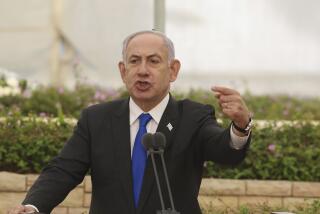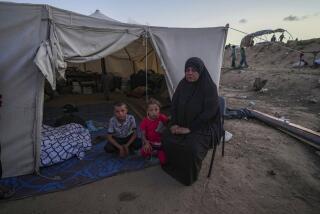3 Arab States Delay Leaving for Peace Talks
JERUSALEM — Echoing the Palestinians, the other three Arab delegations to this week’s scheduled round of Middle East peace talks delayed their Saturday departures for Washington as they awaited some further show of American and world displeasure with Israel over its decision to expel a dozen Palestinians from the West Bank and Gaza Strip.
A Palestinian delay in departing, announced Friday, spread Saturday to Syria, Lebanon and Jordan, all of which announced similar delays.
Like episodes in old-time movie serials, the peace talks always appear to be barreling over a cliff only to regain course at the last minute, and so far this instance appears to be no exception.
Beginning with the first round in October in Madrid and continuing into a December round in Washington, there have been moments of suspense over who would show up, who would agree to meet whom in which room and who would come on time and who would not.
The present crisis seems to be no different because, despite all the protests, no delegation has yet said it will stay away from Round 3, even if Israel’s expulsion decision is not reversed.
The aim of the game appears to be one of winning propaganda points and getting the United States and other outside powers to take a favorable stand. For example, Syria, continuing its drive to enlist international involvement in the peace talks, called the expulsions announced by Jerusalem a “challenge to the will of the whole world, which is working for a peaceful solution to the region’s crisis.”
The Palestine Liberation Organization, which is barred from a direct role in the talks, issued a statement that conditioned the Palestinians’ departure “on more clarifications and assurances from the United States, Russia and the Europeans on the expulsions,” whatever that means.
Amid all the hubbub, the Palestinians claimed to have won a diplomatic victory. Delegates here say that Nabil Shaath, a senior PLO official based in Cairo, has been granted a visa by the United States to travel to Washington during the talks. The report could not be confirmed in Washington.
The presence of Shaath would highlight a continuing behind-the-scenes role of the PLO in the talks, despite Israel’s demand for the total exclusion of that group. “It appears he has a visa,” said Hannan Ashrawi, spokeswoman for the Palestinian delegation here.
“There have been all sorts of pressures for weeks,” she added, pointing out that Shaath was present for the opening round of talks in Madrid and has previously visited Washington.
In Cairo, Shaath himself said that in spite of the announced expulsions of anti-Israeli activists from the Israeli-occupied territories, the Palestinians will eventually show up in the American capital. “We are not going to boycott the peace talks,” he declared. “We will attend.”
Israeli officials said they have heard nothing from Washington about a visa for Shaath. “Of course, it would not be good news,” a senior government official said. He added, however, that Shaath’s presence in Washington would not keep Israel from attending the talks.
The Israelis stood firmly behind their decision to banish the dozen Palestinians. A series of armed ambushes and the shooting deaths of four settlers in the West Bank and Gaza led to a public outcry and prompted the government to order the expulsions.
Prime Minister Yitzhak Shamir insisted that the policy of expulsions is to be exercised only when the “situation is intolerable.” Sixty-seven Palestinians have been forced abroad during the four years of the Arab uprising against Israeli rule in the occupied lands, many of them banished long before armed violence became a feature of the Arab revolt.
The delay of the Palestinians in leaving for Washington was quickly seconded by Jordan, Syria and Lebanon.
The Jordanians, tied to the Palestinians in a joint delegation, postponed their departure for at least a day “in view of the recent developments that emanated from Israel’s decision to expel the 12 Palestinians.”
A Syrian spokesman said his delegation’s scheduled Saturday departure was put off “in solidarity with the Palestinian people and as a denunciation of the Israeli government’s decision to expel 12 Palestinians.”
Lebanon echoed the Syrian and Jordanian statements.
In New York, United Nations officials were reported to be considering a condemnation of Israel. Expulsions of Palestinians have been censured in the past, so it is not clear that a new vote would amount to anything more than a ritual public relations act.
Washington has already issued a call for Israel to rescind the expulsion order. “On the eve of the resumption of negotiations where Israel has Arab and Palestinian partners for peace, it is hard for us to understand why such unilateral action was taken,” a State Department spokesman said Friday. The language was a bit harsher than the usual diplomatic criticism, which is generally limited to deploring the practice of expulsions.
The Palestinians would like Washington to take charge of the negotiations and force Israel to cede the West Bank and Gaza Strip in return for peace. The PLO seized on the uproar over the expulsions to remind the Bush Administration that Israel is continuing to build settlements on the disputed land and to urge action.
“We have also asked for assurances regarding the illegality of the measures of expulsion, the creation of settlements and the formation of an armed settler militia in the occupied territories decided recently by Israel,” a PLO spokesman in Tunisia said.
More to Read
Sign up for Essential California
The most important California stories and recommendations in your inbox every morning.
You may occasionally receive promotional content from the Los Angeles Times.










